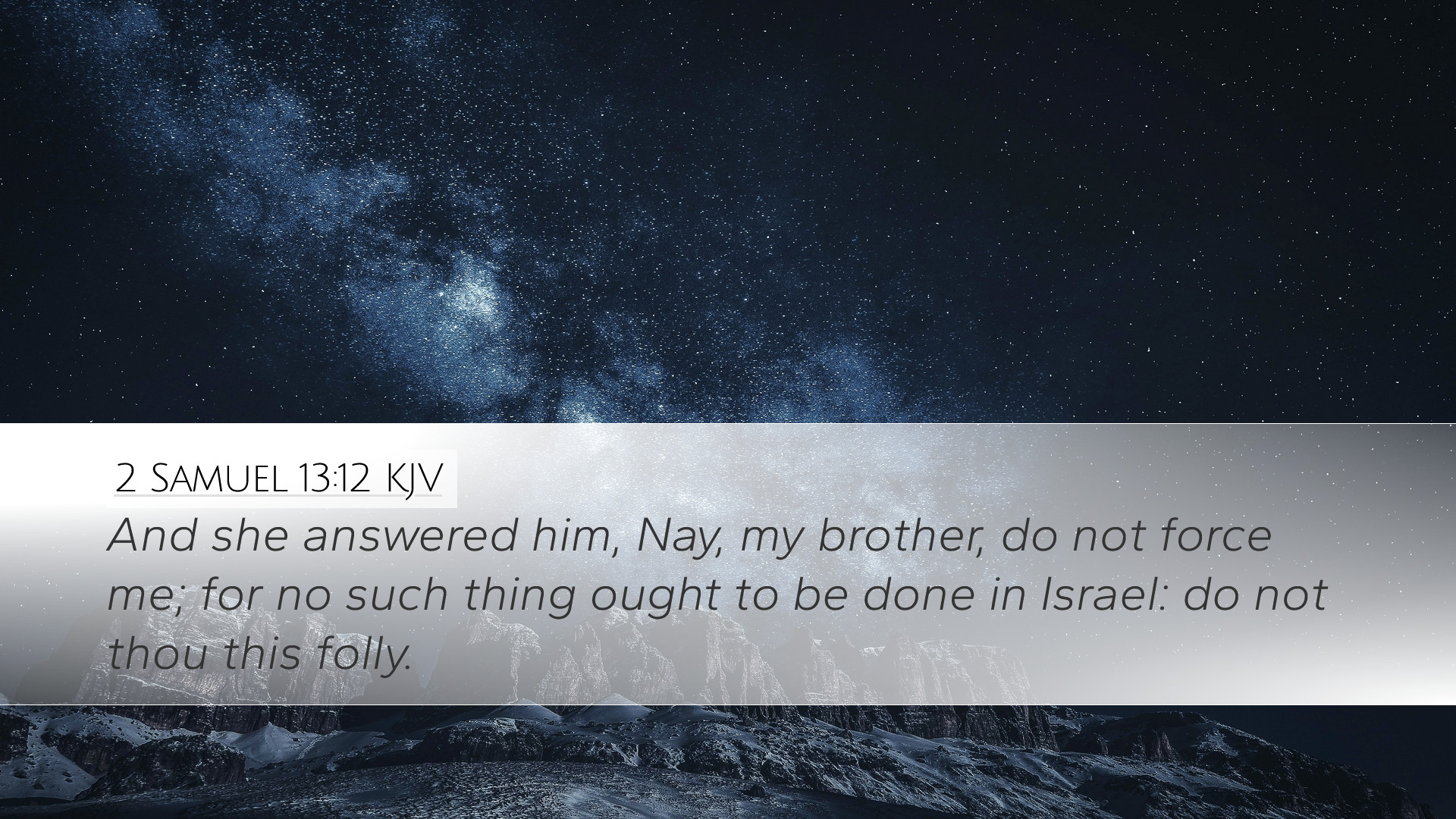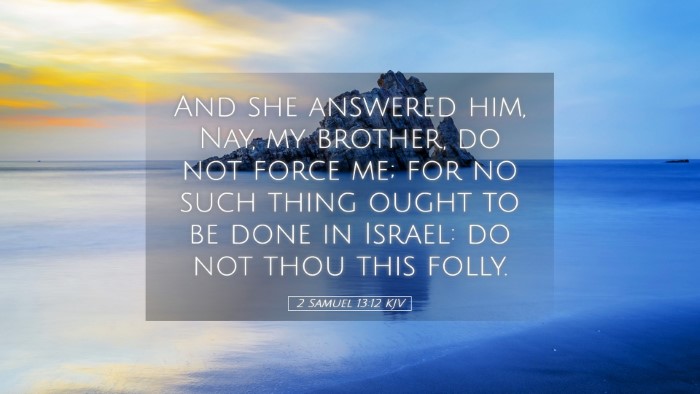Commentary on 2 Samuel 13:12
In 2 Samuel 13:12, we encounter a moment that precipitates a tragic turn of events in David’s family, highlighting the themes of power, desire, betrayal, and the consequences of sin. This verse reads:
“But she answered him, ‘No, my brother; do not violate me, for such a thing is not done in Israel; do not do this outrageous thing.’”
Contextual Background
The chapter depicts a deeply troubling narrative involving Amnon, David’s son, and Tamar, his half-sister. The context of this verse occurs after Amnon's obsession leads him to a disastrous course of action. Knowing that Wendy's desire was rooted in lust rather than love, Tamar's response becomes pivotal in understanding both her character and her situation.
Insights from Public Domain Commentaries
Matthew Henry's Commentary
Matthew Henry notes that Tamar’s plea signifies her understanding of the moral and societal implications of Amnon’s intentions. Her desperate cry emphasizes two crucial elements:
- Moral Standards: Tamar's assertion that such a thing is “not done in Israel” reflects the cultural and religious values that were meant to govern the actions of God’s people. Henry suggests that this societal framework was intended to uphold purity and righteousness.
- The Consequences of Sin: Henry warns against the short-sightedness of desire that leads to disgrace. He highlights that sin often blinds individuals to the grave repercussions it can bring upon them and others.
Albert Barnes' Commentary
Albert Barnes elaborates on the thematic implications of Tamar’s statement. He draws attention to the idea that Tamar represents a voice of reason and morality amidst chaotic desires:
- Clarifying Boundaries: Barnes emphasizes that Tamar is clearly aware of the boundaries that exist in her society, which prohibits such actions. Her plea serves as a reminder of the importance of respecting those boundaries as ordained by both God and society.
- Emotional Turmoil: Amnon’s feelings and actions are contrasted with Tamar’s logic. Barnes frequently points out that emotional upheaval can cloud one’s judgment, leading to actions that are not only harmful but also irreparable. Tamar’s emotional plea showcases the innocence and vulnerability that is often overlooked in such narratives.
Adam Clarke's Commentary
Adam Clarke’s reflections deepen the understanding of the relational dynamics at play. He suggests:
- Sibling Relationships: Clarke points to the tragic irony of this situation being played out within a family. Tamar’s use of the term “brother” underscores the gravity of betrayal, twisting familial bonds into avenues of pain. This juxtaposition amplifies the tragedy of Amnon's actions.
- The Urgency of Tamar’s Response: Clarke also emphasizes the urgency in Tamar’s voice—her endeavor to prevent a wrongdoing that she knows will be destructive. This appeals to the listeners to take integrity seriously and to give heed to the warnings of conscience.
Theological Reflection
This verse invites pastors, students, theologians, and scholars to reflect on broader themes of human sinfulness, the excruciating pain inflicted in relationships, and the call to uphold righteousness even amidst personal desires. The encounter showcases the struggle between a distorted desire and moral obligation, prompting deeper exploration into the nature of sin and its ramifications.
Consequences for Today’s Readers
Today’s readers are called to consider the implications of their actions and the importance of moral integrity. This scripture serves as a poignant reminder of how personal desires can lead to familial devastation. The verse urges believers to be vigilant in upholding God's standards and protecting the vulnerable. It also underlines the significance of listening to voices that advocate for righteousness, as demonstrated by Tamar’s courageous stand.
Conclusion
2 Samuel 13:12 stands as a somber reflection on human behavior and morality. Through the lenses of Henry, Barnes, and Clarke, we gain profound insights into the character dynamics at play, the moral imperatives of society, and the urgent calls for integrity. This commentary serves not only to analyze scripture but also to encourage a modern audience to rise above the struggles of desire and to adhere to the commitments of love and righteousness.
Ultimately, the narrative compels each reader to grapple with their own responsibilities as members of a faith community, urging an earnest pursuit of holiness and safeguarding against the deceptions of sin.


